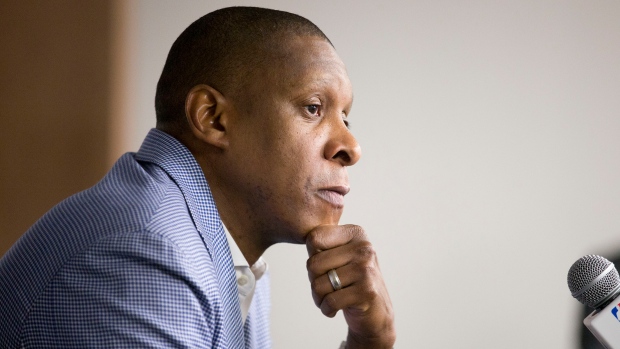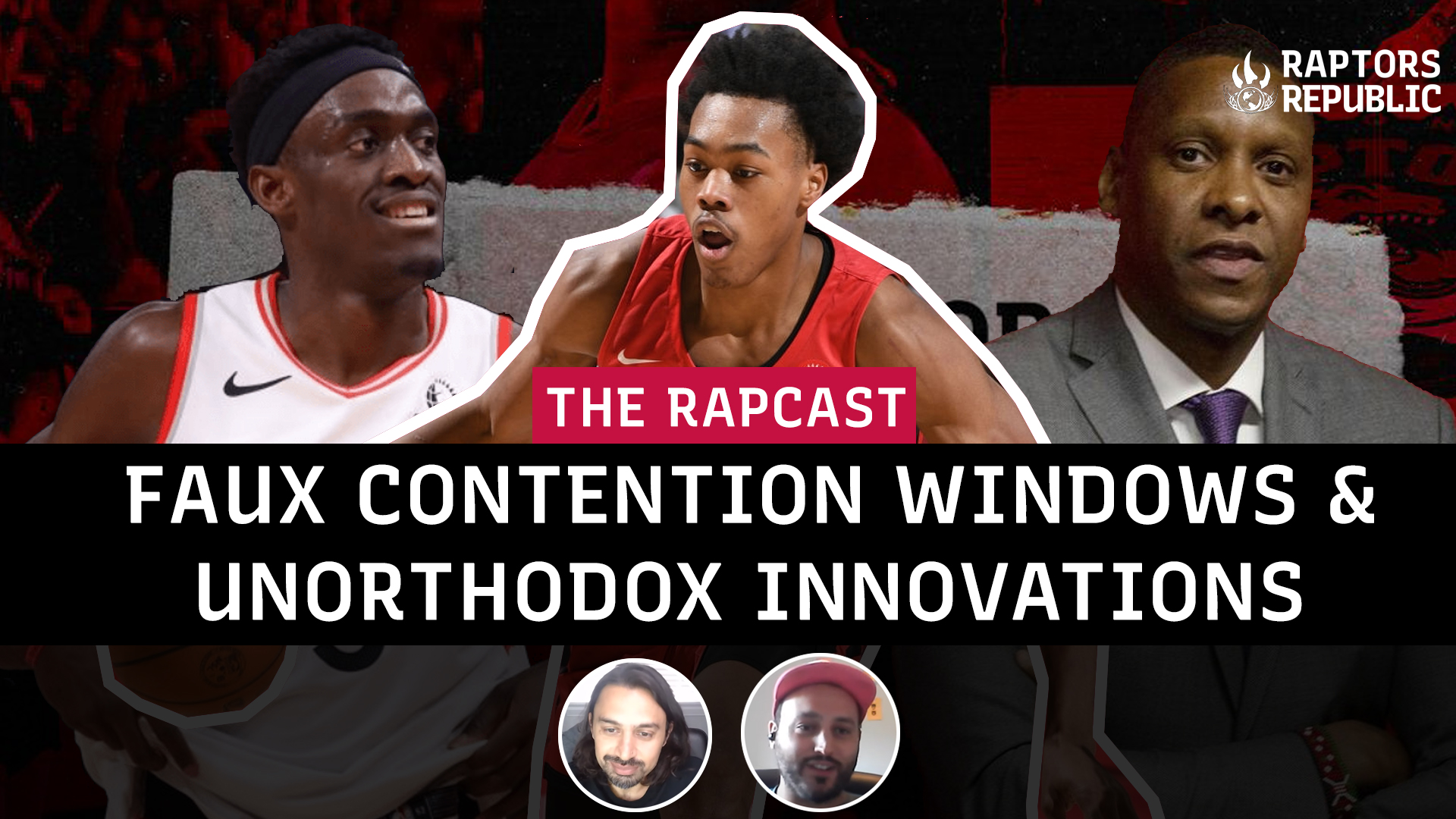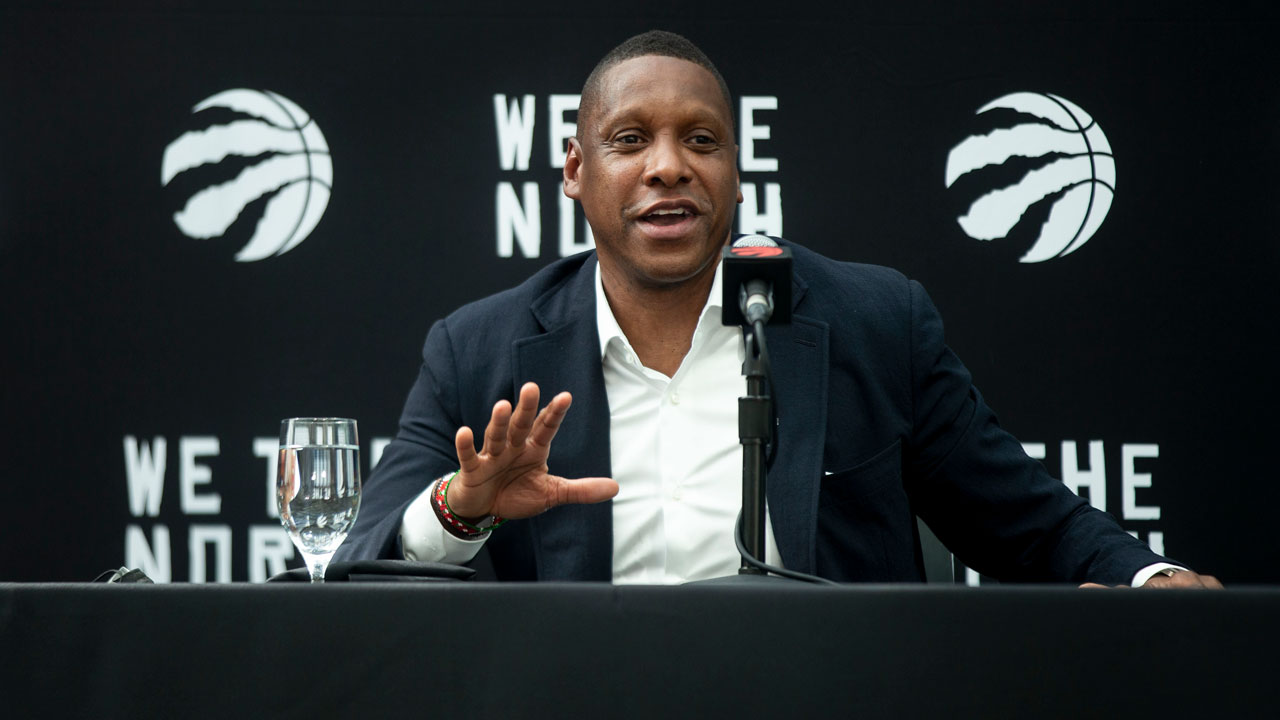“I don’t want this to be about myself,” said Masai Ujiri to start his press conference about his new deal with the Toronto Raptors. He thanked everyone to whom the position was tangentially related, his employer and employees, media and players, family and Kyle Lowry. Ujiri was, as always, himself. Confident and humble, overwhelmed by the attention and completely at home in front of the cameras. He brought his wife and children to the event, and after using the metaphor repeatedly to describe the basketball team, the word became literal at the end as Ujiri ended the conference by taking a family photo.
Toronto’s press conference began with a land acknowledgement recognizing the Anishinaabe people. It was a first for the Toronto Raptors, but MLSE has done it before with the Maple Leafs. It will continue going forward because “we’re learning more about our history and feel that a land acknowledgement is a good place to begin,” said Director of Communications, Jennifer Quinn.
Ujiri and the land acknowledgement set the tone that the Raptors are continuing to grow beyond the basketball court. Toronto’s basketball team is about more than basketball.
When asked what the role of a vice chairman entailed, Ujiri spoke at greater length about his opportunities off the court than on.
“There are things that we have to do as an organization that are going to maybe even be separate from my job as President of Basketball Organizations. When I look at social justice and the opportunities for the BIPOC community here, I think there’s going to be more that we are going to have to do,” said Ujiri.
Ujiri had control of the Raptors’ on-court destiny prior to his promotion. But becoming vice chairman gives him new opportunities and a new platform. It’s no secret that Ujiri has become a celebrity during his tenure with the Raptors. Or as he called it a “public figure.” And with the publicity of his role and platform comes an obligation.
“If we have a voice, we have a place where we can speak and shed light on issues and also help,” said Ujiri. “We have to. It’s an obligation for me, and that’s my interest. That’s my interest, naturally. It’s kind of how my parents taught me to be… We want to win on the basketball court, and we want to win off the basketball court. I think as we do this, we start to bring people along.”
As he always has, Ujiri spoke at length about winning basketball games and NBA championships in Toronto. But there’s more to being a billion-dollar organization than a mandate to win at sports. So too does Ujiri claim a mandate to improve the world. When asked his other options — other fields that sought to steal him from his beloved Raptors — Ujiri specifically mentioned philanthropy, politics, and diplomacy.
“How do we weave them into this organization?” he asked, rhetorically. “We have to evolve.”
The Raptors have been evolving before our eyes. Last April, the Raptors turned Scotiabank Arena into a giant kitchen to feed front-line workers. The Raptors 905 have partnered with local food banks. This June, in a partnership between the city of Toronto and MLSE, almost 27000 vaccinations were given in one day in Scotiabank Arena, setting a North American record. Ujiri uses the program he founded, Giants of Africa, to enrich the lives of African youth beyond basketball. To that end, newly acquired Precious Achiuwa was in a Giants of Africa camp many years ago.
“You guys can call me biased all you want. A kid that was actually in the Giants of Africa camp to come and play as a Raptor?” asked Ujiri. “He’s going to be a phenomenal NBA player. His development means a lot to our organization.”
Ujiri recounted that after the Raptors traded for Achiuwa, the latter’s first word was “finally.”
There have been moments when winning on the court and winning off the court become mutually exclusive, or at least appeared to be so. The Raptors have seemed to prioritize basketball over a familial atmosphere or even off-court justice when the two come into conflict. But the team is, at heart, a basketball franchise. Its choices during those rare moments of intersectional conflict may at times be hypocritical, but intermittent hypocrisy pales in comparison to the huge amount of good that the Raptors have achieved in their community. Communities, considering Toronto’s extended stay in Tampa Bay. And if Ujiri’s remarks prove to signal a further commitment, the franchise is just getting started.
Achiuwa is a good example of the beneficial intersection between winning at basketball and at life. Synchronicity ought to be the norm far more often that on- and off-court tension. Achiuwa is a blue-chip prospect and a former attendee of a Giants of Africa camp. The twin mandates of the team combine in its newest member.
The Raptors are and will increasingly be more than a basketball team. Like Ujiri said at the very beginning, it’s not about himself. The organization is about winning. Ujiri even said that the Raptors drafted Scottie Barnes in part because of how many times he said the word ‘winning’ in his pre-draft interview. They will win again, Ujiri says. It’s just that winning means a lot more to Masai Ujiri than exclusively what happens on the basketball court.



